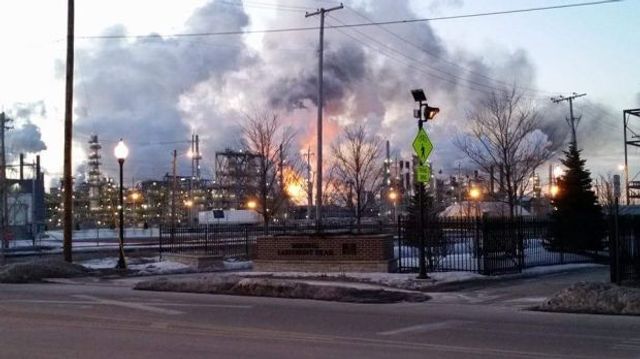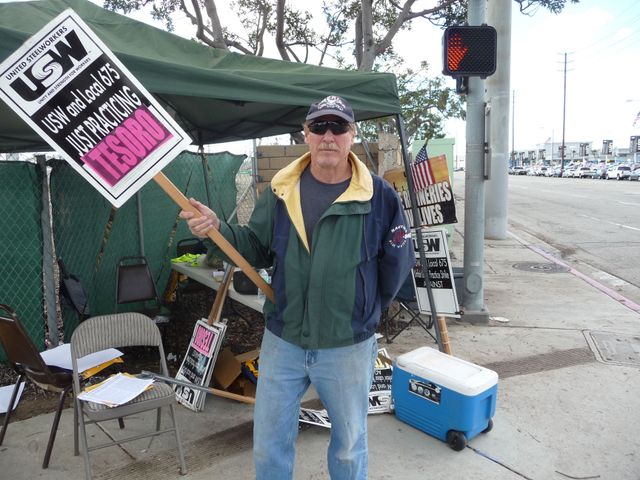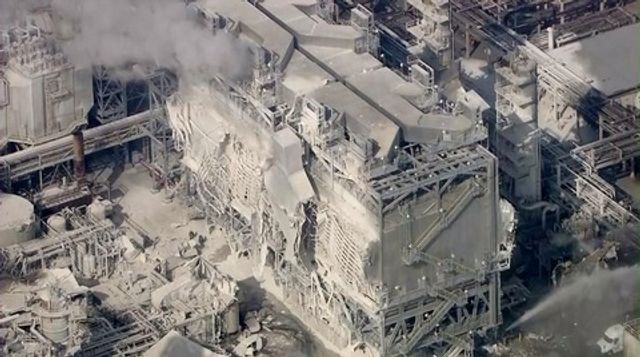Jerry White
Following the breakdown of talks Friday between the United Steelworkers union (USW) and industry bargainer Shell Oil, no date has been set to resume negotiations for a new three-year labor agreement covering 30,000 workers in the US oil industry.
The USW expanded the strike to three additional refineries and one chemical plant in Texas and Louisiana over the weekend, but the union continues to restrict the strike to just 6,500 workers at 12 of the 65 USW-organized refineries in the US. This plays into the hands of the oil giants, who are continuing production and refusing to budge on workers’ demands for improved safety and working conditions.
The top five Big Oil companies, which made $90 billion in profits last year, are pressing for a three-year freeze in wages and the expanded hiring of lower-paid contractors to replace union workers.
In a letter to striking employees, Shell management claimed its ability to hire and fire contractors was beneficial to full-timers. “Hiring flexibility is a proven way to protect our core Shell workforce and the long-term economic viability of our workforce,” the company wrote. “This strategy has served us all well, as we have not had to conduct any layoffs in decades.”
In fact, the exploitation of contractors, a policy long accepted by the USW, undermines the conditions of all workers. While the USW officials are motivated solely by the potential for increased dues income, the expansion of contract labor is part of the drive to cut costs, which is also behind the deadly conditions and impossibly long schedules in the industry.
 Monday's flare-up at the BP Whiting Refinery. Source: The Times of Northwest Indiana
Monday's flare-up at the BP Whiting Refinery. Source: The Times of Northwest Indiana
On Monday morning, a massive flare-up occurred at BP’s Whiting installation in Indiana, lighting up the sky as striking workers stood at picket lines outside the refinery. The release of burning gas, which BP said was due to a compressor problem, lasted for half an hour, workers said.
“As an operator, I rely upon my maintenance people to tell me what is and what is not safe,” Gary Roth, an operator at Tesoro’s Carson refinery, told the World Socialist Web Site Monday. “There are people inside of that refinery who have so much knowledge about the inner workings of each and every piece of equipment, and to lose those people would be to lose our safety.
“The contractors are not familiar with the equipment like our own people. The union maintenance workers can go and put their hand on a compressor or another piece of equipment and know something has to be taken care of because there is an issue. Unless you work with this kind of equipment day in and day out, you cannot do that.”
 Gary
Gary
Over the last three-and-a-half decades, the oil industry, like the steel, auto, mining, trucking, airline and other industries, has carried out a relentless drive to slash jobs and reduce labor costs, while using new developments in technology to increase the output of the remaining workers. The multinational corporations have no intention of retreating and granting the next generation of workers such “outmoded entitlements” as guaranteed hours, job security, health insurance or pension benefits.
Announcing that it had rejected Shell’s seventh offer on Friday, the USW issued a statement with the headline: “Industry demands more blood, will not engage in meaningful talks to address critical safety issues.”
The union listed the companies’ refusal to address “well-documented and widespread safety deficiencies,” reduce “excessive overtime,” or fill permanent vacancies with full-time maintenance workers. “Management refuses to entertain any discussion that impedes on what the companies insist are their sole and exclusive rights—without regard for consequences that can be deadly to employees and destructive to their operations,” the USW wrote.
All of this is true. But the source of the problem is not the companies’ unwillingness to work with the trade unions in labor-management committees. Such committees have long existed. In the name of boosting “corporate competitiveness” and profits, they have agreed to the steady erosion of safety and working conditions.
The real problem is the private ownership of the oil industry by a handful of immensely powerful energy conglomerates that subordinate every aspect of production—from safety and environmental protection to manning levels and infrastructure upgrades—to the drive to increase profits and investor returns. While the oil companies have responded to falling crude oil prices by slashing jobs, reducing exploration and cutting wages and benefits, the one thing they have not stopped is dividend payouts and stock buybacks for the benefit of their richest investors.
 Scene of last week's explosion at ExxonMobil's Torrance, California refinery.
Scene of last week's explosion at ExxonMobil's Torrance, California refinery.
Under capitalism, the private owners have “sole and exclusive rights” over decisions concerning production and the allocation of financial resources. This is despite the fact that these resources are derived from the sweat and labor of the working class.
That is why the fight to guarantee the health and well being of oil workers and the safety of surrounding communities is inseparable from the fight to nationalize the oil industry under the democratic control of the working class. Only in this way can energy production be organized on the basis of human need, not private profit.
The USW and the unions in general are hostile to socialism and defend without question the so-called “right” of the capitalists to privately own the means of production. That is why no matter how many appeals USW negotiators make to the corporations to change conditions “that can be deadly to employees and destructive to their operations,” the sacrifice of workers’ lives and limbs will continue.
Because they have collaborated for decades in corporate cost cutting, the unions have been complicit in the undermining of safety. Next month, the USW is hosting the 2015 Health, Safety and Environment Conference at the Westin Convention Center and Hotel in Pittsburgh, Pennsylvania. In addition to being a junket for union bureaucrats, the March 9-13 conference is a celebration of labor-management “partnership” and a platform to promote the Obama administration and the Democratic Party.
One of the keynote speakers is Joseph Main, Obama’s assistant secretary of labor in charge of the Mine Safety and Health Administration (MSHA). Main epitomizes the elevation of union bureaucrats into corporate management and the government. A long-time safety director for the United Mine Workers, he became a safety consultant for the mine bosses before being hired by Obama to head MSHA.
During his tenure, some of the deadliest mine accidents have occurred, including the 2010 blast that killed 29 West Virginia miners at the Upper Big Branch Mine. The coal operators have received nothing but wrist-slaps for their criminal negligence.
The Obama administration has treated oil bosses no differently. From the kid-glove treatment of BP in the Gulf of Mexico oil spill to last year’s decision by Obama’s Justice Department to drop any investigation into the safety violations that led to the fatal explosion at Tesoro’s Anacortes, Washington refinery, the Democrats have proven to be no less servile to Big Oil than the Republicans.
On the picket line in Anacortes this weekend, workers told the World Socialist Web Site that safety, long working hours and fatigue were overriding concerns, along with efforts to undermine their health benefits. The oil companies, flush with profits, had no reason to squeeze the workers further, one striking worker commented, but “they were doing it just because they could.”
Strikers were angered over the limited strike policy of the USW, which left only a fifth of the industry’s USW workers to take on some of the largest companies in the world. They pointed out that Shell oil workers just down the road were still working while Tesoro workers were walking the picket lines. Others had no doubt that Obama would respond to a strike by all oil workers by declaring it a “national security threat” and illegal.
On the picket line at the BP refinery in Whiting, Indiana, one worker said, “Every one of these refineries is a ticking time bomb.” Referring to the corporations, he added, “Safety costs them and they want to keep as much money in their pockets as possible.”
Under the Democrats and Republicans, another striker said, “The poor are getting poorer, the rich richer, and workingmen have no power. The political process is against you. It doesn’t matter which party it is, they’re both full of crooks. The only time the two parties work together is when it’s against us.”
Among the workers there was solid support for a national strike.
No comments:
Post a Comment